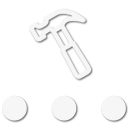Some more thoughts on the discussion here, and on the poll results so far.
Street tires for offroading - Can you do it and get away with it? Yes, but just because you can doesn't mean you should. If you're sticking to graded FSR's or extremely light tracks, you can probably get away with it, especially with some good skills and if you air down. If you're really hard up and can't afford good tires, to where it's a question of street tires or not going out, well then maybe take the adventure and deal with the risk. It's still not a great idea. Even if you're driving a 2wd, non-offroad car, a good set of A/T's will make a huge difference and are well worth the investment. Best to keep the street tires on the pavement or actual dirt/gravel roads (and even the latter is a bit risky).
Driver training specific to off road - Definitely a good idea if you can get it. There are some great instructors out there, and I've been blessed to benefit from their knowledge and expertise at a couple of overland events. Having said that, I've never seen such training readily available in the real world and it's probably very expensive. When I got my first 4x4, I realized of course that I basically had zero clue about off road driving, so I did a ton of research on the topic of 4x4 and off road driving. There are some excellent resources out there online. For example, youtubers like Ronny Dahl and Andrew St. Pierre White have a massive amount of experience off road and have put out much excellent instructional content on all sorts of topics, and there are tons of articles, not to mention this forum. The advice to be found on here is as a rule quite excellent. I wouldn't discount the benefit of general driver training - if you're an excellent driver on the road, you're likely to do well off the pavement. If you're a terrible driver on the road, you're going to be even worse on the dirt. Another point for the inexperienced off roader is to never overestimate yourself - if you take a cautious approach to everything you face out there and think your way through each obstacle without rushing in, you're going to go a long way and likely not get yourself into too much trouble. Before you drive that obstacle, think, "If this goes pear shaped, how hard is it going to be for me to get back out of it?" If the potential consequences of a screw up are relatively minor, you might decide to challenge yourself. If you're going to get yourself royally screwed if you don't execute the obstacle just right, consider passing it by until another time.
Lift - As some have commented, your mileage may vary on this one. It really depends on what vehicle you have and what you plan to do with it. If you know you're going to do some pretty extreme terrain, you probably want to shoot for 10-11 inches of ground clearance or more with the biggest tires you can get. Realistically speaking, though, for overlanding you really don't need that. You can navigate some pretty crazy obstacles and trails with only a minor lift, or perhaps no lift, and appropriately sized tires. For example, a toyota tacoma has over 9" of ground clearance right out of the factory. If you slap the biggest tires you can fit on the stock height without rubbing, or perhaps with some minor trimming of wheel liners, It's probably going to gain you another inch or maybe more, and you'll be well equipped for 99% of overland trails out there. On the other hand, my first rig, a 99 Honda CRV, massively benefited from just a 2" lift and going from factory tires of 205/70/15 to 235/75/15. That lift and tire combination turned it into an absolute beast, and I took it places most people wouldn't believe. Others who suggest you wheel your rig a bit first and see how it manages are giving good advice - it will give you a good idea of whether you need a lift, and if you do, how much. Just keep in mind, lifts more than 2" on IFS or 4wIS are likely to require further modifications like diff drops, etc. so it becomes a case of diminishing returns.
Lights - I got a chuckle that nobody said lights, because they're right. A lot of newbies want to slap a million lumens of light bars and spotties all over their rig, but lights don't get you unstuck lol. Off road lights are a huge benefit if you do a lot of night driving, no question. Regular headlights are not ideal for off road terrain, and the more gnarly it gets, the less useful they are. Having said that, you absolutely can get by with your normal high beams when off roading even at night, especially on less extreme tracks.
This leads me to another one that surprisingly wasn't on the poll - a winch. Is a winch absolutely necessary for off roading? Generally speaking, no. There are many ways to mitigate a bad stuck situation without having a winch. Is a winch an outstanding insurance policy against a bad day? Absolutely. Winches can be rather terrain specific of course - if you're wheeling in the middle of the bald desert or rocky boulders of Utah, a winch may not be of any use to you, since a winch is only as good as its anchor, so that's something to keep in mind. I had a winch on my last vehicle and I plan to get one for my current ride, but neither of them had/have light bars or spotties. Winch before lights is good advice.














